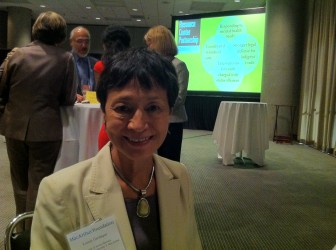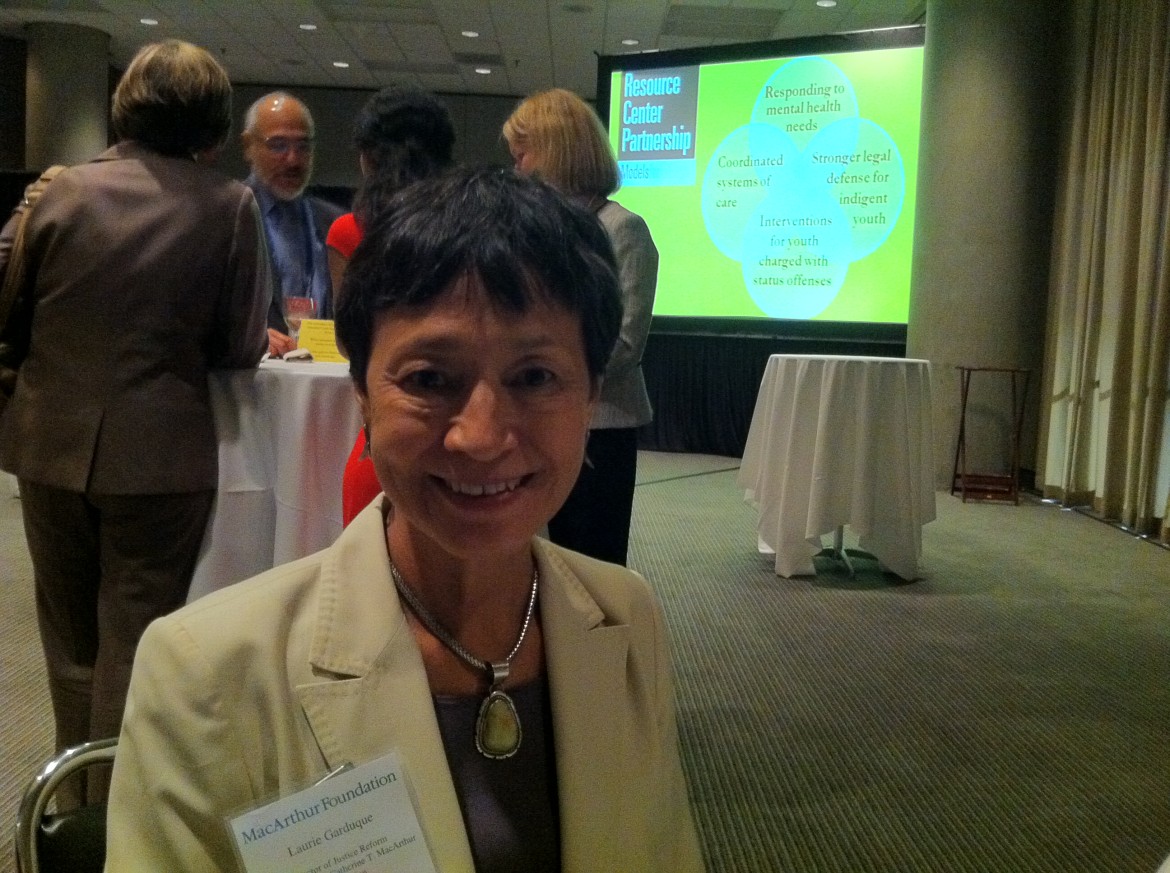ATLANTA — The John D. and Catherine T. MacArthur Foundation announced it will increase its juvenile justice reform funding by some $15 million, a major part of which will be used to establish the new Models for Change Resource Center Partnership.
“Right now there are no go-to places to get the kind of information, resources, toolkits, [and] access to colleagues who have ‘been there done that,’” for would-be juvenile justice reform advocates, said Laurie Garduque, director of justice reform for the MacArthur Foundation.

Maggie Lee / JJIE
Laurie Garduque, director of juvenile justice reform for the MacArthur Foundation, announced the new $15 million juvenile justice spending at a state lawmakers conference in Atlanta.
Garduque said the Partnership aims to be that place people call when they want to make the kind of policy changes the MacArthur Foundation says result in better outcomes for kids and communities: rehabilitation, treatment in home communities and competent legal defense, among other things.
Creating the Partnership is the latest round in nearly two decades of MacArthur research, funding and advocacy on juvenile delinquency treatment and prevention.
The announcement came at the 2013 summit of the National Conference of State Legislatures, an annual gathering of some 5,000 state lawmakers, staff, advocates, lobbyists and others. NCSL will be one of several allies that MacArthur will tap to help coordinate and push juvenile justice reforms, according to the Foundation’s announcement.
That’s the the other half of what the Partnership aims to do, said Garduque: make sure people like legislators, sheriffs and court administrators see MacArthur-researched juvenile justice practices when they get together and discuss their own best practices.
The Partnership will set up four go-to centers in different policy areas: Mental health training and care, legal defense, status offense reform and a more general juvenile justice center focused on court-involved youth. The last center will be led by the Robert F. Kennedy National Resource Center for Juvenile Justice.
The work the National Juvenile Defender Center (NJDC) will do as one of the four resource centers will be familiar, said NJDC Senior Policy and Communications Associate Rey Banks.

Maggie Lee / JJIE
Rey Banks of the National Juvenile Defender Center says joining the new MacArthur Partnership will add the gravitas of the respected foundation to her office’s work.
The scope of work as a partner to MacArthur will be familiar because “we are a resource center already,” said NJDC Senior Policy and Communications Associate Rey Banks. The Washington, D.C.-based NJDC links up juvenile defense reformers with case studies, research, examples from other states, expert testimony and other resources.
“This brings the gravitas of the MacArthur Foundation to our organization,” said Banks.
In mental health, the Partnership Resource Center will be the Center for Mental Health and Juvenile Justice, (NCMHJ) based in Albany, N.Y.
Becoming a Resource Center is “the next major step up the ladder,” said NCMHJJ Director Joseph Cocozza.
The NCMHJJ already works in 16 states, helping juvenile justice systems handle youth who have mental health disorders. That can include diverting certain youth and treating them appropriately when they must be in custody.
The center “will be an opportunity and mechanism to spread the message nationwide,” said Cocozza.
The Partnership is expected to be fully operational by the end of 2013. The new spending brings MacArthur funding of juvenile justice programs to $165 million, according to the Foundation.
Editor’s note: The MacArthur Foundation is a supporter of the JJIE.
